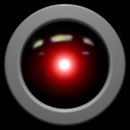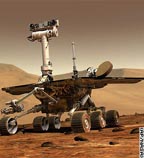|
Perhaps the ultimate robotic vehicle is the spaceship controlled by an artificial intelligence. The concept is employed today in a rudimentary way within the probes currently sent to other planets in our solar system. More complete realizations in which the vehicle is not only operated by artificial intelligence but actually has a personality appear in our movies, TV shows and written literature.
The best known example is the HAL 9000 computer embedded in the Jupiter-bound spaceship in the movie "2001: A Space Odyssey" and more familiarly known as just "HAL" Why "HAL"? Take "IBM" and go one letter further in the alphabet for each letter in the name. It's a movie-maker's joke.
HAL controlled all aspects of the spaceship's operation, receiving instruction and information from crew members, sensors and a radio link from earth.  HAL used wall-mounted sensors like this one to observe events within the ship.
HAL also had a tendency to paranoia brought on by conflicts between his programmed instructions, instructions from
the crew and events observed through sensors - an all too human condition, with tragic results for the crew. HAL used wall-mounted sensors like this one to observe events within the ship.
HAL also had a tendency to paranoia brought on by conflicts between his programmed instructions, instructions from
the crew and events observed through sensors - an all too human condition, with tragic results for the crew.
A question to consider: When people act inappropriately due to mental or psychological imbalance, it's part of the human condition. When robots/artificial intelligences act inappropriately it's "technology out of control." Or, maybe, "the devil (programmer) made me do it!" What does this tell us about the way we view artificial intelligence? Is it valid to make the distinction?
| 
 HAL used wall-mounted sensors like this one to observe events within the ship.
HAL also had a tendency to paranoia brought on by conflicts between his programmed instructions, instructions from
the crew and events observed through sensors - an all too human condition, with tragic results for the crew.
HAL used wall-mounted sensors like this one to observe events within the ship.
HAL also had a tendency to paranoia brought on by conflicts between his programmed instructions, instructions from
the crew and events observed through sensors - an all too human condition, with tragic results for the crew.
